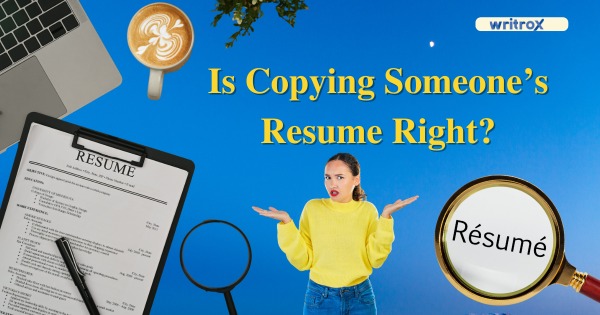Is Copying Someone’s Resume Right?
As the job market becomes more and more competitive, your resume is often what decides whether or not you will get that dream job. However, creating a copy resume from someone else’s might not be the best approach. A great resume is always about your experiences, skills, and achievements coming off uniquely. Now, it is the right of someone to seek inspiration from successful resume examples but, should you copy someone else’s resume? This practice is so widely discouraged for various reasons, which we’ll discuss in this article, and also tips to create a good Professional resume. Why Should You Not Copy Someone’s Resume? While copying someone else’s resume may seem like a simple solution for those who are looking to create the perfect document that will land them their dream job, it does have quite a few consequences as well. Your Resume is a reflection of who you are – your qualifications, experiences & what aspirations do have in your career. This will not only bring down your credibility but also have ethical and legal issues. Authenticity is a huge thing for employers, they want to see you and your personality not another version of someone else. Reasons Why You Should Not Copy Someone’s Resume You Lose Credibility If you copy someone’s resume, you will lose a chance to tell your story .Your resume is your personal document showcasing your own individual skills, experience, and character. You are essentially going to be projecting qualities and accomplishments that aren’t actually yours by copying in this context. If your resume is not real enough, so will the employer know you lack credibility. Because it allows employers to get a sense of who you are and how well you would work with their team Inaccurate Representation In copying from somebody else, you may incorrectly represent your skills and experiences. This can make an employer expect you do to things that you cannot. If you get a job with the resume copied, and then are unable to fulfill these expectations – disappointment or dissatisfaction. Representing your skills accurately aligns with everyone’s expectations of you and of course the one who hired you. Loss of Confidence Using somebody else’s CV as a base can reduce your confidence in what you have achieved and are capable of doing. Writing your resume on that tells you more about what you have been doing with your career is also a good reason. This does not only increase your self-confidence but also when you go for an interview and get to discuss what skills or work experiences make you better than others. Missed Opportunities for Personalization The copied resume may not be customed to the job for which you are applying. Having your resume reflect the most recent experiences that are relevant to the position you are applying for will show off what you have learned, versus filling up space with information from 5 years ago. Customizing your resume illustrates that you have done some research and are actually interested in your position. Hiring managers are more likely to notice a resume that is created specifically for them. Lack of Growth An important professional skill is writing your own resume as it requires you to introspect about your career journey, recognize what sets you apart from others, and convey the same. This process can be extremely eye-opening and empowering as it forces you to dig deeper into your professional story. You would even become more expert in advertising yourself, which is an important trait you need of so many when it comes to taking advantage of career advancement opportunities. Also Read : What are the 7 basic steps to write a Perfect resume for Job? Best Practices for Resume Writing Create a Personalised Resume You need to personalize your resume for each job application and you want to list out some features that separate you from the current employee and match you with this specific role. You need to be researching the job description and look into the company. Tailoring each resume to every job post is important. Begin by showcasing your special talents, experience, and qualifications that relate to the job you are targeting. Use of Templates and Examples Well-prepared templates and good examples will help make the resume writing process easier, keeping your document clean (structured) as well. Templates help in structuring your information, ensuring that you do not leave out any important sections; contact details, summary or objective statement, work experience, skills, and education Seeking Guidance and Feedback Asking for help and input during the process is essential to creating a resume that you can be proud of. In the meantime, you could also seek advice from a career counselor, mentor, industry expert, or resume writing expert as they will be able to offer more specific feedback catered to your field of work. So, they can help you with some information like this is what the resume trends are these days or something such as it. Conclusion Writing a good resume is about striking the right balance between making it personal, and structured and having feedback. By tailoring your resume with an emphasis on highlighting who you are, what value can bring to the table, and managing how awesome it (i.e., aligning them with their requirements) developer is; instead of telling a hiring manager that be damned their needs – which want this job. Templates and examples are great for helping sequence your resume well and make it look decent, adapting to focus on showcasing the things you do can maintain its elements. Work with a professional career expert and ask for feedback from someone who you trust to get your resume in a professional format.



